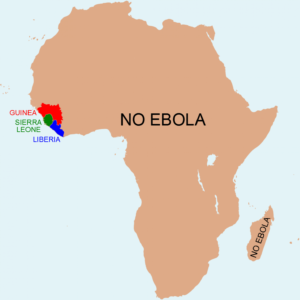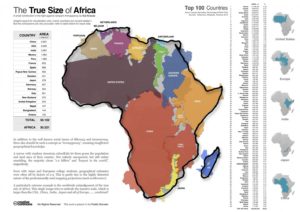
Fears of an Ebola outbreak reaching U.S. borders has caused one teacher in Kentucky to resign after non-stop backlash over her traveling to Kenya, forced two New Jersey students originally from Rwanda to stay home from school and caused a significant amount of trips to Kenya, Zimbabwe and South Africa to be cancelled.
While this may seem like Americans taking precautions from catching the potentially fatal illness, one British chemist released a map of Africa that makes incidents like these look irrational and, quite frankly, ignorant.
Anthony England, a chemist who earned a doctorate at Massachusetts Institute of Technology (MIT) and has spent many years in different regions of Africa, published a map on his Twitter account that revealed just how much of Africa is actually battling major Ebola outbreaks.

Other countries have had their share of Ebola scares.
Nigeria and Senegal have both had reported cases but are currently believed to be free of the virus.
The DR Congo reported a different strain of the virus but it is currently believed to be contained.
Lastly, there was one reported case in Mali but no other cases have since been reported after that patient’s death.
Either way, these facts certainly don’t support the backlash in cases such as the teacher who went to Kenya and two students from Rwanda.
In fact, the information doesn’t seem to support any widespread fear or paranoia about the Ebola virus taking over America or other parts of the African continent where people might be traveling.
That’s precisely why England felt it was necessary to share the map on social media.
“Ignorance and misinformation is a big problem with Ebola,” England wrote in an email to the Washington Post. “So a clueless Kentucky school causing the resignation of a teacher because she spent time in Kenya is just idiocy and that idiocy leads to fear, which leads to people like [New Jersey Governor] Chris Christie implementing nonsensical anti-science quarantine restrictions. Ebola in the U.S. is becoming a farce.”

A map released in 2010 by Kai Krause revealed that there is enough space on the African continent to fit the entire U.S., China, India, Japan, France, Spain, Germany, Italy, Switzerland, the UK, Belgium and eastern Europe and still have a significant amount of land area left over.
Many Americans also failed to accurately identify most of the African countries on a blank map.
The Washington Post decided to put their readers to the test, only to find out that many of their readers received scores of 60s or lower when asked to locate different African countries.
Two of the countries that are experiencing Ebola outbreaks, Guinea and Sierra Leone, ranked in the top 5 least recognized countries and Liberia was just out of reach as the sixth least identified country. All three of the countries were identified correctly be less than 25 percent of the test takers.
The test results seem to support the idea that many Americans don’t actually know exactly where Ebola outbreaks are happening. They simply identify Ebola with the entire African continent.
Only a little more than 3 percent of the online test takers received perfect scores and the only two countries that were correctly identified by more than 90 percent of the test takers were South Africa and Madagascar. Egypt was identified correctly by 89 percent of the test takers and Morocco came in fourth with 75 percent of the test takers correctly identifying the country’s location.
Meanwhile, England hopes America and other great nations can put their fears of unlikely Ebola outbreaks aside and focus on helping countries that don’t have the means to help themselves.
“Eventually the rich world will realize that it makes no sense to leave one part of the world struggling in poverty with such terrible infrastructures,” he wrote to the Washington Post. “Before it’s done, this Ebola outbreak might teach them all that.”


